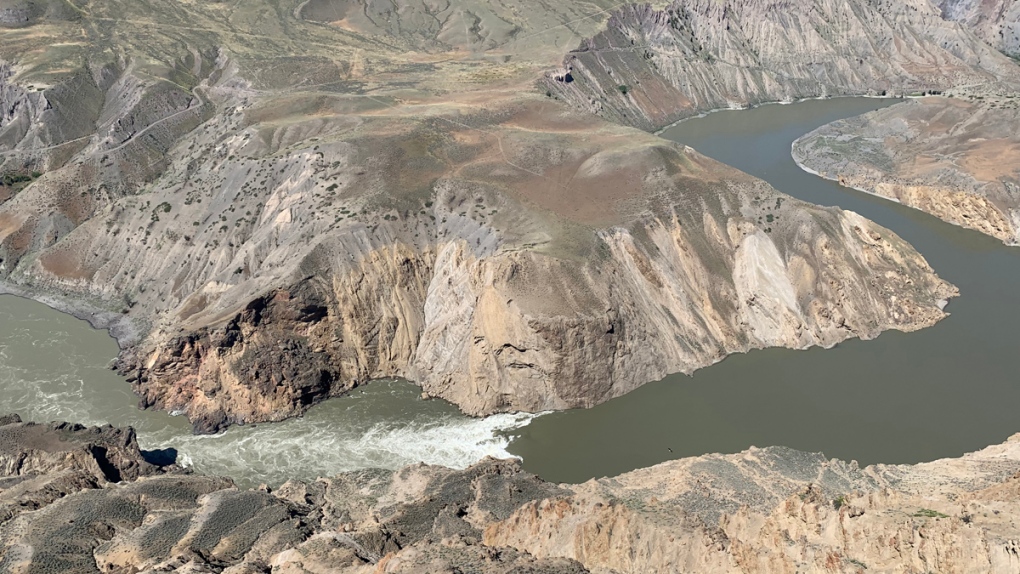$176M permanent salmon fishway at Big Bar landslide delayed: DFO
 (Ministry of Forests, Lands, Natural Resource Operations and Rural Development)
(Ministry of Forests, Lands, Natural Resource Operations and Rural Development)
Construction of a $176 million permanent fishway to help salmon populations get past the Big Bar landslide will be delayed, according to the Department of Fisheries and Oceans Canada.
The landslide in B.C.’s Southern Interior is believed to have happened in late October or early November 2018, but it wasn't discovered until June 2019.
The incident created a five-metre waterfall that's preventing many fish from swimming upstream to spawn. Work on site has been ongoing ever since.
In a technical briefing Wednesday morning, landslide response director Gwil Roberts said there had been delays at the site during the winter. Extreme cold weather meant crews had less time to prepare for installation of the permanent system.
“Then we had a freeze-thaw period where we had very quick changes, -10 degrees celsius overnight and then +10 during the day,” Roberts said. “That created some instability on the slope where teams were preparing the bed for the fishway.”
As a result, Roberts said the fishway “will not be installed by May 2022 as planned.”
The pricey project was announced in December, with the department saying work would “begin immediately to take advantage of low river levels in winter.”
Fisheries officials say they expect thousands of migrating salmon to still be able to pass through the site this year thanks to temporary structural changes, including a “nature-like” fishway.
Michael Crowe with Fisheries and Oceans Canada said the fishway is “performing as hoped" and chinook salmon are able to make it through the slide zone without many problems. Though early arrivals of sockeye salmon remain vulnerable in high waters.
Work will also continue this year to transport fish via truck around the slide zone, while the tube system, or “salmon cannon” will not be used. Roberts said it was not technically feasible.
“When we did a cost benefit analysis of that system, it did not make sense so we decided to focus on our truck and transport system this year,” he said.
CTVNews.ca Top Stories

DEVELOPING Live updates as Stormy Daniels testifies at Trump hush money trial
Adult film star Stormy Daniels will take the stand a second time Thursday as former U.S. president Donald Trump’s hush money case continues in Manhattan. Follow live updates here.
Toronto Maple Leafs fire head coach Sheldon Keefe
The Toronto Maple Leafs have announced that Sheldon Keefe has been relieved of his duties as head coach.
Bank of Canada says financial system is stable, but risks remain
The Bank of Canada says the Canadian financial system is stable, but risks remain due to debt servicing costs among households and businesses and stretched valuations of financial assets.
Why these immigrants to Canada say they're thinking about leaving, or have already moved on
For some immigrants, their dreams of permanently settling in Canada have taken an unexpected twist.
Here are the ultraprocessed foods you most need to avoid, according to a 30-year study
Studies have shown that ultraprocessed foods can have a detrimental impact on health. But 30 years of research show they don’t all have the same impact.
Capital gains tax change 'shortsighted' and 'sows division' business groups tell Freeland
Forging ahead with increasing Canada's capital gains inclusion rate 'sows division,' and is a 'shortsighted' way to improve the deficit, business groups are warning Finance Minister Chrystia Freeland.
Ontario man frustrated after $3,500 paving job leaves driveway in shambles
An Ontario man considering having his driveway paved received a quote from a company for $7,000, but then, another paver in the neighbourhood knocked on his door and offered half that rate.
RateMDs violates privacy of health professionals, class-action lawsuit claims
A lawsuit against RateMDs has been given the go-ahead by a B.C. Supreme Court judge who found the claim that the website violates the privacy rights of medical professionals is not 'bound to fail.'
Defence attacks Stormy Daniels' credibility as she returns to the stand in Trump's hush money trial
Stormy Daniels will return to the witness stand Thursday in Donald Trump's hush money trial as the defence tries to undermine the credibility of the porn actor's salacious testimony about their alleged sexual encounter and the money she was paid to keep quiet.






























